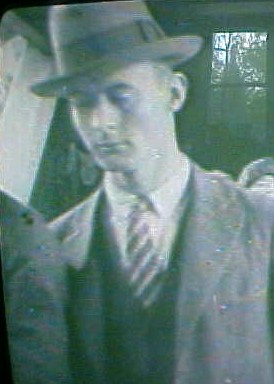? JEB & DASH
Behind the Diaries
"Jeb Alexander" is the pseudonym of a gay man who lived in Washington, D.C. during the first half of the 20th century. From 1918 until the early 1960s, Jeb kept an exhaustive diary recording the people and events he encountered every day.
Originally he envisioned these entries to be the basis of character studies for short stories he would write. In 1926, In A Rut, the first story he ever wrote, won First Place in a writing competition sponsored by Washington's Daily News. The achievement filled Jeb with expectations of future successes -- but it was the only story he would ever finish. Jeb was undisciplined and aside from that one accomplishment, the diaries never served the purpose he intended.
Jeb Alexander, seen here as an extra in the 1924 silent film, POOR MRS. JONES. He was 25, working in a dead end position in a government printing office and dreaming of the books and stories he would one day write.
Photo background: Truman Adkins and Brian Judge, who have researched details of Ina Russell's book since its publication (including what became of many individuals in the story), unearthed a rare copy of this film and had it transferred onto DVD. (Photo: Courtesy of Truman Adkins.) More Photos.
Jeb died in 1965, leaving the entire collection of diaries (more than 50 volumes) to his niece, Ina Russell. "Perhaps he left them [to me] as an act of faith between lovers of literature," she writes in the introduction to her book, Jeb and Dash: A Diary of Gay Life. Because they both shared a cultural memory of Washington, Jeb knew Ina was likely to appreciate the milieu of his entries. She did skim a few: "I was curious to find out if he was -- as I always thought -- gay so I read the entries for Sundays, when he was likely to visit his family. My mother was his sister." For the most part, the diaries remained in storage while Ms. Russell raised a family.
When she turned her attention to the diaries again in the 1980s, a cultural shift in attitudes towards gay people and gay culture made Jeb's story more relevant than ever. As she pored through the densely detailed entries, deciphering Jeb's cramped and increasingly illegible handwriting, she discovered a fascinating chronicle of life in Washington, D.C. -- and even more importantly, a rare, contemporaneous account of gay society, all related in the poetic voice her uncle had honed over the years. Blended into the minutia of daily activities was the life of a typical closeted gay man of those times.
To write her book, Ina interwove details from different entries into a narrative that brought order to Jeb's story. She changed names and created composite characters to avoid unintentionally outing anyone who might still be alive. By focusing on the themes her uncle wrote about, she created a picture of Washington in the years between the two world wars -- and in doing so, she also filled in a gap in gay history.
When her book was published in 1993, it proved to be a revelation to both the gay and the publishing communities.* In the years that followed, another story -- almost as fascinating as Jeb's story itself -- began to take shape as readers came forward to tell how the book had affected them. Aside from her uncle and Dash (whom she met briefly), Ina had no knowledge of anyone else in the diaries. With the assistance of a librarian, she was able to track down obituaries for many of the individuals. Perhaps most movingly, a man in Charleston, SC, now in his 90's, came forward; his life was the basis for one of the book's central characters.
When playwright Michael Conley first encountered the book, his original reaction was that it would make a TV mini-series or movie (Background Interview). But after being unable to shake the characters and realizing there were themes in the story that would resonate with a wider audience, he began to think of how it could become a play. He approached Ms. Russell for the dramatic rights.
After a series of public readings (including two Equity readings at the Walnut Street Theatre, Philadelphia), the play had a workshop in New York City in June 2005, coinciding with the city's celebration of Lesbian and Gay Pride.
And what will happen to the original diaries? After the book was published, it drew the interest of the Library of Congress, which has asked to take possession of the diaries. In future years, historians will be able to study them to learn about a unique time in our nation's history.
* A sampling of reviews of the book, Jeb and Dash: A Diary of Gay Life:
"Its overreaching insight into gay life long before Stonewall…makes Jeb and Dash a landmark book." Bob Summer, Lambda Book Report
"A door has been opened to view gay life first-hand in bygone eras… A superlative insight into early 20th-century gay history." Michael A. Lutes, University of Notre Dame Library
"An unrivaled look at (his) life and thoughts…putting us much in the debt of the surviving niece who edited his diaries." Bob Roehr, Independent Gay Forum
Quotes from Ina Russell are taken from the book and conversations between Ina Russell and Michael Conley. Book reviews quotes are taken from citations.
NEXT PREVIOUS HOME
Copyright © 2007 Michael Conley. All rights reserved.
